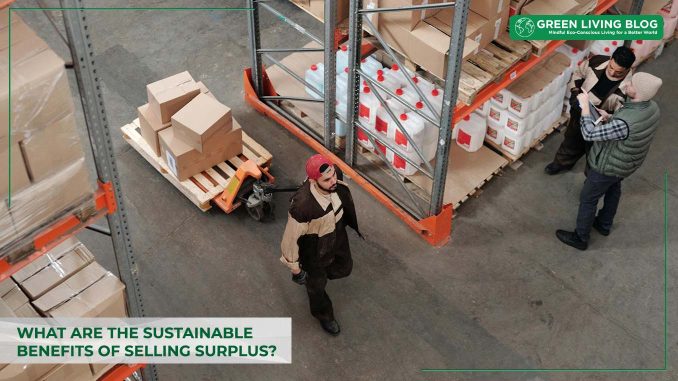
Companies with excess inventory usually only have two options — they either landfill or hold onto it for the foreseeable future.
Selling surplus has emerged as an environmentally sound alternative.
Can companies use it to become more sustainable?
1. Helps Fund Sustainable Initiatives

Even if companies don’t landfill their surplus right away, it doesn’t do them much good sitting in storage and collecting dust — especially considering carrying costs account for 20% of the total budget in most industries. They get more money to fund sustainable initiatives when they sell their excess inventory instead of holding on to it.
Many industries store or toss their excess inventory because they think it’ll be cheaper than other alternatives. For example, companies in the business sector typically throw out their old furniture and office equipment. If they realized they could save money by selling it, they’d be less inclined to choose the landfill.
2. Saves Finite Natural Resources
As most people know, there’s only a finite amount of raw natural resources on the planet. If every company sold its surplus instead of landfilling it, it wouldn’t need to deplete the Earth’s limited reserves of minerals, gases, ores, and fuels.
Many industries rely on rare materials to produce goods, so selling surplus would benefit them. For example, the consumer electronics sector needs a lot of gold and copper. While landfilling those precious materials makes them unusable, selling them preserves them.
3. Reduces Air, Soil and Water Pollution

Over time, landfills pollute the soil, water and air with heavy metals, harsh chemicals, and greenhouse gases. Incinerators aren’t much better since they spew toxic ash. Selling surplus goods reduces a company’s waste, meaning less is disposed of unsustainably.
Even one industry’s commitment can make a massive difference. Suppose companies in the automotive sector sold their surplus car batteries back to manufacturers for recycling. In that case, they’d prevent sulfuric acid and lead from leaking into the soil — a massive win for the environment.
4. Simplifies Sustainable Initiatives
Companies selling their surplus directly to their communities could make local sustainability initiatives easier. For example, restaurants and food manufacturers could sell their perishable ingredients and raw materials to the city or local community centres to use as compost. Even small and medium-sized businesses can benefit the environment by selling their excess.
5. Reduces Greenhouse Gas Emissions

Raw natural resources must travel halfway around the world to get to their destination since there are only a few pockets of materials like lithium, copper, or aluminium. Transportation makes up 28% of all greenhouse gas emissions in the United States — and commercial shipping accounts for roughly half of that percentage.
Companies don’t have to transport raw natural resources via a plane or a cargo ship from the other side of the globe when they buy and sell each other’s surplus inventory. Since they don’t rely on the logistics process as much, they produce fewer greenhouse gas emissions.
6. Increases Sustainability Awareness
Companies landfill surplus in secret because they don’t want customers to know about their less-than-sustainable side. They’re more likely to be vocal when they switch to a strategy, they can feel proud of — like selling to wholesalers, charitable organizations, or their communities. This way, consumers become more aware of the importance of sustainability.
Many industries have grown used to tossing excess inventory. The retail sector landfilled 66% of the textiles it produced in 2018. As soon as their competitors begin selling surplus — increasing consumers’ awareness of sustainability — they’ll feel pressured to stop their unsustainable practices.
7. Lessens Environmental Disruption

Companies that sell surplus inventory to their competitors instead of sourcing raw natural resources don’t disrupt plants and animals nearly as much. Rather than strain the environment, disrupt local wildlife, or pollute nearby waterways with mining activities, they use what’s already been pulled from the Earth.
Selling surplus is undeniably more sustainable, whether companies get raw materials by mining ore, clearcutting forests or butchering animals. Countless industries could adopt this practice to protect the environment for improved environmental hygiene.
8. Promotes a Circular Economy
Companies can only sell surplus if someone’s willing to buy it. While this might sound negative, it’s actually positive — the reciprocal relationship they build helps them move away from raw material sourcing and incentivizes others to get on board, promoting a circular economy within their industry.
While the concept of a circular economy is growing more popular daily, this could give it the shove it needs to become an industry standard. For example, while many construction companies toss materials like concrete, wood, and brick when they tear down a building, they could instead sell their surplus for use in new projects to close the loop.
Selling Surplus Is a Sustainable Alternative
Companies can save money and free up valuable space by eliminating excess inventory. More importantly, they reduce pollution, increase sustainability awareness, and lower their total greenhouse gas emissions. Selling surplus is beneficial for businesses and the environment.
![]()
Author Profile
- Online Media & PR Strategist
- Blogger and Educator by Passion | Senior Online Media & PR Strategist at ClickDo Ltd. | Fascinated to Write Lifestyle Blogs in News & Education I have completed a journalism summer course at the London School of Journalism and manage various blogs.
Latest entries
 Green GuidesMay 29, 202519 Best Eco-Friendly Products, Services & Gifts – With Special Deals
Green GuidesMay 29, 202519 Best Eco-Friendly Products, Services & Gifts – With Special Deals List postMay 28, 202510 Everyday Items with PFAs (‘Forever Chemicals’) and Green Alternatives
List postMay 28, 202510 Everyday Items with PFAs (‘Forever Chemicals’) and Green Alternatives List postMay 22, 20258 Eco-Friendly & Energy-Saving Home Gadgets for Daily Routines
List postMay 22, 20258 Eco-Friendly & Energy-Saving Home Gadgets for Daily Routines Green LivingMay 15, 20258 Healthy BBQ Swaps for a Cleaner, Greener, Guilt-free Grillfest
Green LivingMay 15, 20258 Healthy BBQ Swaps for a Cleaner, Greener, Guilt-free Grillfest






Leave a Reply
You must be logged in to post a comment.